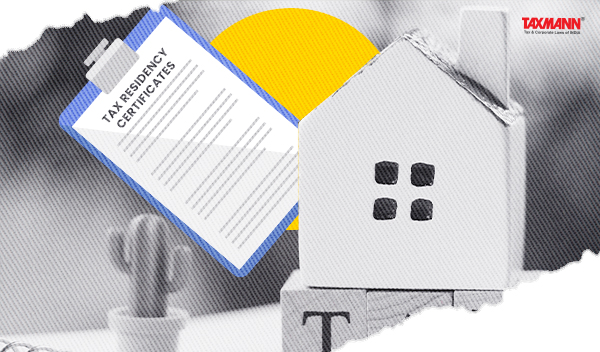[Opinion] Tax Residency Certificates | Another Litigious Issue Brewing?
- News|Blog|International Tax|
- 3 Min Read
- By Taxmann
- |
- Last Updated on 10 July, 2024

Kunal Singhal – [2024] 164 taxmann.com 215 (Article)
Tax Residency Certificate (“TRC”) is an official document granted by a country’s tax authorities, certifying the tax residency status of a tax payer, for a tax year. In the context of Indian domestic income-tax regulations, tax treaties generally contain beneficial provisions in relation to taxation of business profits, Royalty income, Fees for technical services, Dividend etc. Hence, establishing tax residency of a tax payer attains significance in case of taxation of non-residents.
1. Legal requirement to furnish TRC
The requirement of furnishing a TRC to be eligible for beneficial provisions under any tax treaty was brought under the Income-tax Act, 1961 (“the Act”) vide section 90(4) from AY 2013-14. Hence, TRC plays a pivotal role in availing tax treaty benefits. It follows that pivotal role played by TRC in availing tax treaty benefits, some contentious issues have also come up. One of the most recent and thought provoking issue which has come up is whether TRC is conclusive evidence of tax residency or the tax authorities should go beyond it for determining tax residency.
2. Treaty benefits in absence of TRC
Before we discuss this issue, lets first understand the role of a TRC in enabling a tax payer to claim beneficial provisions of a tax treaty. More importantly, whether tax treaty benefits can be denied to a taxpayer in absence of a TRC.
Section 90(4) vs section 90(2)
As discussed earlier, section 90(4) of the Act makes it mandatory for a NR to obtain TRC from its home country to avail tax treaty benefits in India. Whereas section 90(2) of the Act provides as following:
“Where the Central Government has entered into an agreement with the Government of any country outside India or specified territory outside India, as the case may be, under sub-section (1) for granting relief of tax, or as the case may be, avoidance of double taxation, then, in relation to the assessee to whom such agreement applies, the provisions of this Act shall apply to the extent they are more beneficial to that assessee.“
(Emphasis supplied)
Generally, Article 4(1) of a tax treaty ‘”resident of a Contracting State” means any person who, under the laws of that State, is liable to tax therein by reason of his domicile, residence, place of management, place of incorporation or any other criterion of a similar nature.It is important here to note that the tax treaties usually do not require any tax payer to produce a TRC or any specific document for proving its eligibility to avail beneficial treaty provisions. Thus, it should be sufficient for tax payer to demonstrate that it is tax resident of a particular country, through a relevant document. A question arises as to whether section 90(4) overrides section 90(2) to the extent that it imposes production of certain specific documents upon the tax payer for availing benefits under tax treaty.
2.1 Judicial view
The jurdiiary till date has answered the above question in negative. Ahmedabad ITAT observed that the provisions of section 90(2) of the Act shall apply only to the extent they are more beneficial to that the taxpayer and that section 90(4) cannot be construed as limitation to the tax treaty superiority. Therefore, in the absence of a valid TRC provisions of section 90(4) could not be invoked to deny tax treaty benefits. Nevertheless, onus was on the taxpayer to give sufficient and reasonable evidence to satisfy the requirements of Article 4(1) of the tax treaty. Similar views have been upheld by Hyderabad ITAT.
However, lower tax authorities still favour the view that production of TRC is a mandatory requirement, specially when there is minimal guidance available on what other documents would constitute as sufficient enough proof of tax residency. Therefore, obtaining and production of TRC and Form 10F remains an important requirement to provide tax treaty benefits to an assessee.
Click Here To Read The Full Article
Disclaimer: The content/information published on the website is only for general information of the user and shall not be construed as legal advice. While the Taxmann has exercised reasonable efforts to ensure the veracity of information/content published, Taxmann shall be under no liability in any manner whatsoever for incorrect information, if any.

Taxmann Publications has a dedicated in-house Research & Editorial Team. This team consists of a team of Chartered Accountants, Company Secretaries, and Lawyers. This team works under the guidance and supervision of editor-in-chief Mr Rakesh Bhargava.
The Research and Editorial Team is responsible for developing reliable and accurate content for the readers. The team follows the six-sigma approach to achieve the benchmark of zero error in its publications and research platforms. The team ensures that the following publication guidelines are thoroughly followed while developing the content:
- The statutory material is obtained only from the authorized and reliable sources
- All the latest developments in the judicial and legislative fields are covered
- Prepare the analytical write-ups on current, controversial, and important issues to help the readers to understand the concept and its implications
- Every content published by Taxmann is complete, accurate and lucid
- All evidence-based statements are supported with proper reference to Section, Circular No., Notification No. or citations
- The golden rules of grammar, style and consistency are thoroughly followed
- Font and size that’s easy to read and remain consistent across all imprint and digital publications are applied



 CA | CS | CMA
CA | CS | CMA
